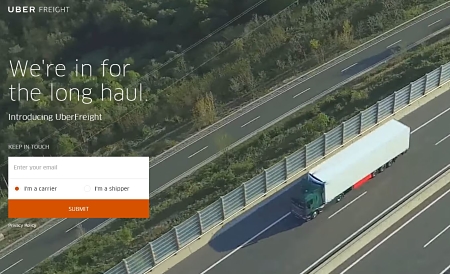Uber moves into the freight business
With its recent acquisition of startup Otto, Uber Freight is getting into the long-haul trucking business.
Late last month, the company completed its first commercial delivery, a 120-mile load of beer for Anheuser-Busch from Fort Collins to Colorado Springs on Interstate 25.
“We think this technology is inching closer to commercial availability,” said Lior Ron, co-founder of Otto.
Otto plans to expand its fleet of trucks from six to about 15 and is forging partnerships with independent truckers. Starting next year, Otto-branded trucks and others equipped with Otto technology will begin hauling freight bound for warehouses and stores, he said.
“Maybe some might be skeptical that it’s happening, but if you think 50 years from now there’s still going to be people calling trucks to find out where the truck is when GPS was invented 80 years ago, we know that that’s not possible,” stated Eric Berdinis, product lead at Uber Freight. “The future can’t be that way, and we know we’re marching down the right path. “Uber has already started pitching services to shippers, truck fleets and independent drivers, and the services go well beyond Otto’s initially stated goal of outfitting trucks with self-driving technology. It also plans to compete with the brokers who connect truck fleets and shippers.
Fully autonomous trucks remain years away – some trucking industry experts estimate two decades – and the Otto vehicles are currently manned by a driver and an engineer. But the Uber-Otto efforts include a host of other technologies involving navigation, mapping and tracking, which can be deployed even as work continues on self-driving systems.
Uber aims to ultimately transform the competitive and fragmented $700 billion-a-year trucking industry, which is notorious for low margins. The company is challenging a host of established players, ranging from publicly traded companies, such as third-party logistics firms C.H. Robinson and XPO Logistics, to countless mom-and-pop trucking businesses.
Otto has had motor carrier permits with the U.S. Department of Transportation and California Department of Motor Vehicles to move cargo since earlier this year. Eleven days after the close of the Uber acquisition in August, Otto filed for a new permit to haul freight, noting it would expand its fleet to 15 trucks.
Ron said Otto also aims to partner with the industry, and that “thousands” of owner-operator truck drivers have reached out to the company.
“We are talking with everyone,” he said. “We don’t want to develop technology just for the sake of technology.”
While Uber’s brand and financial backing could supercharge Otto’s prospects, industry experts remain skeptical that a Silicon Valley startup with little experience can shake up long-haul trucking.
“The transportation industry is a relationship-backed business,” said Kevin Abbott, a vice president at C.H. Robinson. “There’s a lot more to it than just finding a piece of equipment.”
Abbott said Uber is just the latest in a long line of companies that have tried to take the place of brokers, who typically match loads with vehicles.
Uber and Otto also face competition from a growing crop of startups eyeing the industry. Companies such as Transfix, Convoy and Cargo Chief are aiming to unseat traditional brokers by matching shippers with carriers using complex algorithms, while Trucker Path has built a popular navigation app for truckers.
“This is really about connecting the dots, connecting the shippers and the carriers,” Ron said. “We are building that on the long-haul piece. Uber, through UberRush and UberEats, built that on the urban piece,” referring to the company’s on-demand delivery services.
Self-driving trucks may eventually ease the driver shortage facing the trucking industry. But even absent autonomous technology, Otto says it could help decrease the cost of trucking goods by more quickly finding freight, mapping more efficient routes and reducing fuel consumption.
“In Uber, you press a button and an Uber shows up after three minutes,” Ron said. “In freight … the golden standard is that it takes the broker five hours of phone calls to find your truck. That’s how efficient the industry is today.”
Uber is hardly alone in tackling that problem. XPO Logistics – among the world’s biggest logistics services – has invested heavily in software that maximizes the utilization of trucks and reduces fuel consumption.
C.H. Robinson has developed technology that allows companies to track their shipments, as well as an app for carriers with small fleets.






